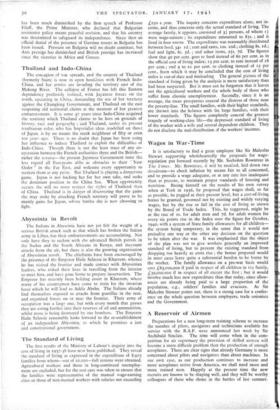Wages in War-Time
It is satisfactory to find a great employer like Sir Malcolm Stewart supporting wholeheartedly the proposals for wage- regulation put forward recently by Mr. Seebohm Rowntree in The Times. Mr. Rowntree, it will be recalled, laid down two desiderata—to check inflation by means fair to all concerned, and to provide a wage adequate, or at any rate less inadequate than at present, to maintain proper standards of housing and nutrition. Basing himself on the results of his own survey when at York in 1936, he proposed that wages shall, so far as possible, be pegged at their present level, but a cost-of-living bonus be granted, governed not by existing and widely varying wages, but by the rise or fall in the cost of living as shown by the Board of Trade Index: This, he suggested, might be at the rate of is. for adult men and 7d. for adult women for every six points rise in the Index over the figure for October, 1940, with a system of State family allowances for all children— the system being temporary, in the sense that it would not prejudice one way or the other any decision on the question to be taken after the war. It was emphasised that the object of the plan was not to give workers generally an improved standard of living, but to prevent the existing standard from dropping too heavily as costs rise ; the bonus proposed would in most cases leave quite a substantial burden to be borne by the worker. The family allowance on a pre-war basis would cost £83,000,000 if paid in respect of all children in the family, £39,000,000 if in respect of all except the first ; but it would involve much less new expenditure than that today, since allow- ances are already being paid to a large proportion of thd population, e.g., soldiers' families and evacuees. As Sir Malcolm Stewart points out, there is a strong case for a confer- ence on the whole question between employers, trade unionists and the Government.






























 Previous page
Previous page